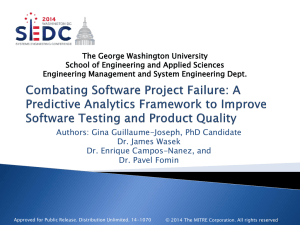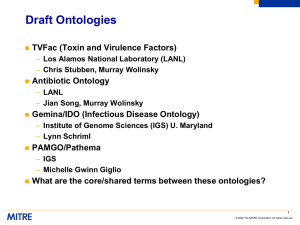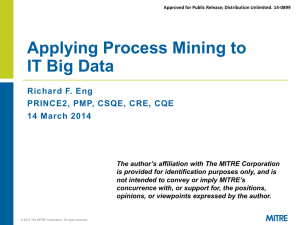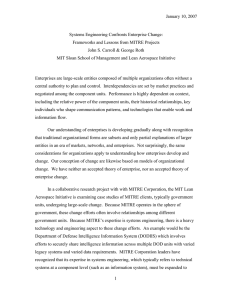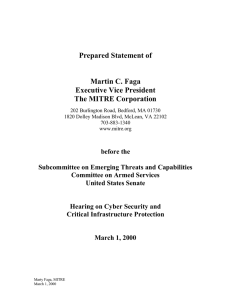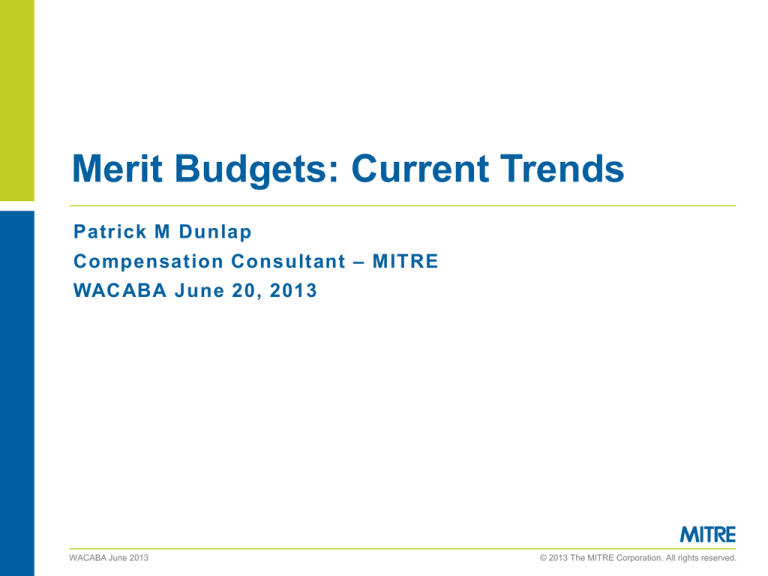
Merit Budgets: Current Trends
Patrick M Dunlap
Compensation Consultant – MITRE
WACABA June 20, 2013
WACABA June 2013
© 2013 The MITRE Corporation. All rights reserved.
|2|
MITRE manages 6 FFRDCs
Federally Funded Research and Development Centers
– Center for National Security (DOD -Air Force, Army, Navy,
Marines, FBI, CIA).
– Center for Advanced Aviation System Development (FAA)
– Center for Connected Government:
IRS and US Department for Veteran Affairs
Homeland Security Systems Engineering and Development Institute
US Courts (the Judiciary Engineering and Modernization Center)
Center for Transforming Health (CTH); Center for Medicare/Medicaid
– MITRE has its own independent research and development
program that explores new technologies and new uses of
technologies to solve our sponsors' problems in the near-term and
in the future.
© 2013 The MITRE Corporation. All rights reserved.
WACABA June 2013
|3|
MITRE’s Pay Philosophy
MITRE's compensation policies and practices are designed to
attract and retain the leading-edge workforce necessary to meet
our clients' needs at a reasonable cost, to reward
accomplishments, and to motivate employees to better their
collective results from year to year. To that end MITRE….
Provides pay which is competitive with other premier companies
working in the areas of systems engineering, information
technology, and research and development
Provides promotion and merit increases which reward growth of
responsibilities and capabilities along with higher performance
and relative value
– Comp Shop - The more you know about pay, the better…you may
not agree with everything we do but you will think it’s fair.
© 2013 The MITRE Corporation. All rights reserved.
WACABA June 2013
|4|
Merit Budgets: Current Trends
Questions:
1.
2.
3.
4.
What are companies doing these days with smaller budgets?
Why have the budgets been so small?
Does pay for performance still exist?
Are companies using “lump sum” merit increases as alternatives
to “base salary” merit increases?
5. Do you use “cost of living” or “cost of labor” in your analysis?
6. Are there innovative/creative ways that companies can spend
their merit pools to get more out their staff?
7. Does communication make a difference?
© 2013 The MITRE Corporation. All rights reserved.
WACABA June 2013
|5|
1. What are companies doing these days with
smaller budgets?
Spending all of it!
Why?
– To remain competitive.
– To keep their top performing staff?
Are we “paying for performance” or simply keeping market
competitive?
– Small budgets do not allow for much differentiation but we try to
maintain a 3 percentage point margin for top performers
– Trying to encourage (not always successful) more use of 0%
increases
We monitor our position to the market closely.
We answer to the DCAA not the stock market.
© 2013 The MITRE Corporation. All rights reserved.
WACABA June 2013
|6|
2. Why have the budgets been so small?
– What’s going on?
– Is it the economy?
Economic Recession
Slow growth
Inflation (CPI/COL)
US debt
© 2013 The MITRE Corporation. All rights reserved.
WACABA June 2013
|7|
Employment Cost Index
© 2013 The MITRE Corporation. All rights reserved.
WACABA June 2013
|8|
3. Does pay for performance still exist?
MITRE – yes, we still use it.
– The only reason we have ratings is to differentiate raise
percentages.
– We want the top 10% to get 3-4 points more than the rest of the
staff. We set up the merit matrix to accomplish it.
– Why?
© 2013 The MITRE Corporation. All rights reserved.
WACABA June 2013
|9|
Illustration: How Market Data Leads
to Pay Guides
Typical
market
low
Market
avg. total
cash
$50K
$70K
Q1
min
Q2
Q2
$90K
Q3
control
point
‘Guide Positions’
‘Guide Points’
© 2013 The MITRE Corporation. All rights reserved.
Typical
market
high
WACABA June 2013
Q4
Q4
max
| 10 |
4. Are companies using “lump sum” merit increases as
alternatives to “base salary” merit increases?
We are using both; individually or in a combination.
LSMs are another tool in the Comp “Tool Box”
Use as needed.
LSMs can be benefit bearing or not.
MITRE’s are not. (so far).
It’s a 1 year cost; helps keep long term costs down.
– LSs do not “stick” like base salary increases do.
Staff remains market competitive from a Total Cash (TC) perspective.
– Do staff like them?
From what we hear - Mostly not, but some do.
© 2013 The MITRE Corporation. All rights reserved.
WACABA June 2013
5. Do you use “cost of living” or “cost of
labor” in your analysis?
MITRE salary guides or ranges are set based on cost of labor.
We participate in 15 job match Surveys every year.
As well as 3 Salary Budget Surveys annually.
There are 27 job families at MITRE.
– 9 MTS or technical jobs. – examples:
Systems Engineering
Electrical Engineering
SW Engineering, Comp Science and Math
– 18 MPS or professional support job – examples:
Accounting, Finance & Treasury
Human Resources
Creative Services
© 2013 The MITRE Corporation. All rights reserved.
WACABA June 2013
| 11 |
6. Innovative/creative ways to spend their
merit pools to get more out their staff?
We are searching for answers to that question.
– Do staff see merit budgets as entitlements?
– Budgets have been so small that any increase is seen as more
about keeping staff market competitive than rewarding
performance.
What are your companies doing?
© 2013 The MITRE Corporation. All rights reserved.
WACABA June 2013
| 12 |
| 13 |
7. Does Communication make a difference?
In MITRE’s approach we believe communication is key
– The more you know about pay, the better…you may not agree with
everything we do but you will think it’s fair.
Help staff understand how compensation works.
– What drives merit budgets?
The labor market; employers.
– We participate in annual salary budget and job match surveys.
– This establishes the “Cost of labor” by job.
What is happening in the economy?
© 2013 The MITRE Corporation. All rights reserved.
WACABA June 2013
| 14 |
Communications: Share information; tell
them why
Media – use web and meetings to set expectations.
– Live Comp Road Shows to staff and managers
– Letters to management
– What’s in the news? – post on company web.
– What is the business case for your company.
Based on a Company’s Comp Philosophy and goals
– You may need a higher or lower budget in a given year.
MITRE example – around 2002/2003
– Targeted “total cash average” pay in market was 50th percentile
(roughly the middle of the market).
Turnover was unacceptable.
– Moved the target above the 50th percentile
– Turnover came down to acceptable limits.
© 2013 The MITRE Corporation. All rights reserved.
WACABA June 2013
| 15 |
Tools for Managers; info to share
Having a Successful Merit Conversation – five steps to communicate
the Annual Review results to your staff, in a 10- to 15-minute one-on-one
meeting.
FAQs for Managers — answers to questions that staff and managers
have asked about the Review, as of 12/11/2012.
2013 Annual Review “Overview” for Managers — an overview to this
year’s Annual Review with a focus on the business drivers that
influenced how this year’s guidelines were developed.
2013 Annual Review Guide — a compensation guide to this year’s
Annual Review. It includes information about new salary ranges (Pay
Guides) and merit pay guidelines (including the merit budgets and Merit
Matrix) for the Review.
Annual Review Results - provide you with analysis that reflects the
Annual Review results and other information that employees might ask
about.
Compensation Resources – assigned staff – contact info.
© 2013 The MITRE Corporation. All rights reserved.
WACABA June 2013
| 16 |
Backup
Metrics
| 17 |
Percentage of Staff Receiving LSMs by
Rating and Range Position
© 2013 The MITRE Corporation. All rights reserved.
WACABA June 2013
| 18 |
Pay Website @ MITRE
© 2013 The MITRE Corporation. All rights reserved.
WACABA June 2013
| 19 |
Tom Edgar’s takeaways from 6/20 Program.
Communication
Rate of Attrition (needs to be over 10% to keep inflation down)
Price of Services driving pay more than Labor Market
Education/Training of Managers on Comp and How to deliver the
message is critical
Manage Employee Expectations
Culture – must be consistent with corporate philosophy and
management behaviors. Don’t advertise “pay for performance” if
you can’t/won’t deliver it.
© 2013 The MITRE Corporation. All rights reserved.
WACABA June 2013

